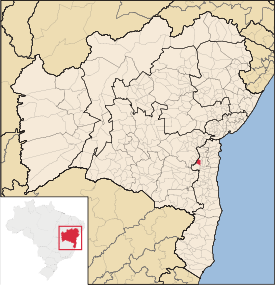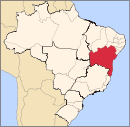Ipiaú
From Wikipedia, the free encyclopedia
| Ipiaú | |
|---|---|
| city | |
| Nickname(s): Model Bahia City | |
 | |
 Ipiaú | |
| Coordinates: 14°8′13″S 39°44′2″W / 14.13694°S 39.73389°WCoordinates: 14°8′13″S 39°44′2″W / 14.13694°S 39.73389°W | |
| Region | Nordeste |
| State | Bahia |
| Founded | 1913 |
| Incorporated (town) | 1 August 1916 |
| Incorporated (city) | 2 December 1933 |
| Government | |
| • Mayor | José Andrade Mendonça |
| Area | |
| • Total | 286,597 km2 (110,656 sq mi) |
| Population (2006) | |
| • Total | 42,437 |
| • Density | 148.1/km2 (384/sq mi) |
| Time zone | BRT (UTC-3) |
| ZIP code | 45.570-000 |
Ipiaú is a city in Bahia, Brazil. It is located at around 14°8′13″S 39°44′2″W / 14.13694°S 39.73389°W.
The city is located at the confluence of the Contas River and the Água-Branca River (White-water River).
Ipiaú is bordered, in counterclockwise fashion, by Ibirataia and Jequié to the north, Aiquara and Jitaúna to the west, Ibirataia and Barra do Rocha to the east and Itagibá to the south.
The city is an important producer and exporter of cacao in Brazil.
Is the birthplace of many noted Brazilian, writers and musicians, including Euclides Neto and Luiz Caldas.
This article is issued from Wikipedia. The text is available under the Creative Commons Attribution/Share Alike; additional terms may apply for the media files.
